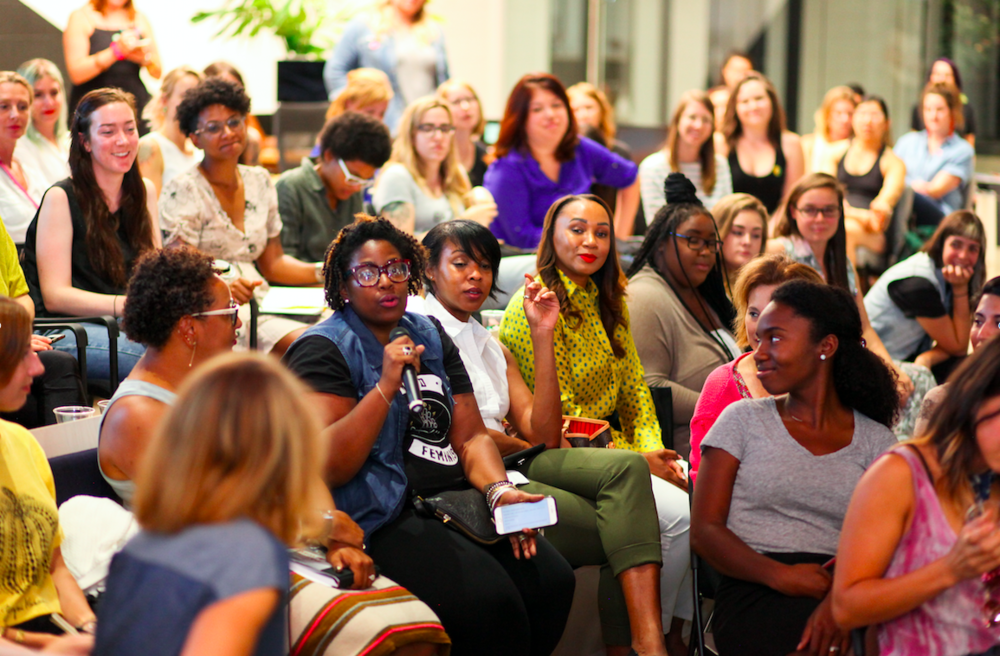
Photograph by Jayne Liu
This is a recap of our kickoff town hall in Portland, OR last month. Thanks to Jayne Liu for photographs, ConnectiveDX for loaning us extra chairs (!), Occidental Brewing and Union Wine for the beverages.
As women began streaming into Swift’s building more than an hour before start time, we got the feeling that this was something our community needed. After an engaging two hours with a lively lineup of panelists and packed house, we knew it was needed. A record-breaking 150+ women showed up on a warm late summer night to listen, share, and start a dialogue. We heard women both confirm and challenge each other’s ideas and experiences, and create a safe space to agree and also offer new perspectives. With two local business owners on our panel, it was refreshing to hear employers offer their two cents on hiring or negotiating experiences shared by the audience.
Our kickoff town hall felt like the tip of the iceberg. Feedback we received (and agree with) is that our community would like to continue the conversation and expand to include more industries and demographics. We always appreciate your feedback, please drop us a line anytime at ladiesgetpaidpdx@gmail.com.
KEY TAKEAWAYS
1. It’s not because of luck that you have what you have, and it’s not wrong to want more.
Referring to previous jobs, Panelist and Portland Monthly Executive Senior Editor Kelly Clarke shared: “I excused bad pay for so many years. I didn’t believe that anyone would pay for my services, I thought everything that happened was luck.” She continued: “It’s their job to try to make it work, it’s not your job to try to make it better for everyone else.”
2. Adjust your attitude and routine to make confidence a habit.
We were lucky to have Propeller Consultant Brooke Graham speaking, and she cited a recent study on applying for new positions. When asked how much of a job description one needs to feel confident in to decide to apply, women answered 60% while men averaged 40%. “Men have had the luxury of improvising and filling in those gaps. We have to work doubly hard to be noticed,” Brooke said. An awesome tip from LGP founder Claire: “practice when the stakes are low.” Challenge that additional fee from the airline company, and send back the cocktail that’s way too sweet to drink.
3. Acknowledge your talents, and let people know what they are.
“It’s equally important to market yourself to your peers and your superiors. Women don’t like to brag, but it’s important people know what you’re good at,” said Liz Valentine, CEO and co-founder of Swift, which employs 135 people. She shared insightful points as an employer and woman who has challenged gender inequality in the workplace. “Own what you’re good at. If you do that, you’ll lose that sense of insecurity.”
4. It’s not rude to negotiate – there’s always an opportunity to continue the conversation.
“Even when an offer is in your range, negotiate.” When negotiating, think beyond salary if you can’t get a pay raise: flexible schedules, additional PTO, mental health days, or fewer duties can be part of overall compensation. Kelly, for example, has a massage day clause in her contract: if she needs to take a self-care day, she can, no questions asked. Research market value, and go into a meeting prepared with that information. To get a sense of fair pay for your position, industry, and location, we recommend glassdoor.com and also, as LGP founder Claire suggested: “ASK WHITE MEN.” Brooke had a great note on language when going into a meeting: “Instead of being scared to ask, frame an ask as ‘how might we achieve this together?’”
5. Spot talent.
To the bosses and managers among us, Portland Garment Factory founder Britt Howard talked about her responsibility as a business owner and leader to recognize potential. “I try to look at my employees’ potential to blossom into a promotion before they ask—whether or not there’s an existing role for them to grow into.”
6. If you don’t ask, they don’t know how to say yes.
Don’t expect others to read your mind when it comes to a raise, a more flexible schedule, a change in roles. As Liz suggested: “Be clear about what you need. Set expectation and boundaries. Be clear about what it’s going to take for you to be happy.”
7. Get paid.
Sounds like a no-brainer, but it was insightful to hear how folks have tackled the sticky issue of clients who try to dodge paying for work. Liz shared a clear policy to fall back on if necessary: final assets are delivered upon payment. Britt described standing her ground with large accounts who wrongly assumed she might let it go. And AKQA UX Designer Aimée Reed brought the house down with laughter and cheers when she divulged her novel time-tracking method: measuring hours worked by number of Law & Order episodes playing in the background.
We closed out the night with an awesome mantra from an attendee, who shared that she works in a male-dominated industry and knows she’s been called a bitch by coworkers. “Bitch? BITCH just means Boys, I’m Taking Charge Here.” MIC DROP.

